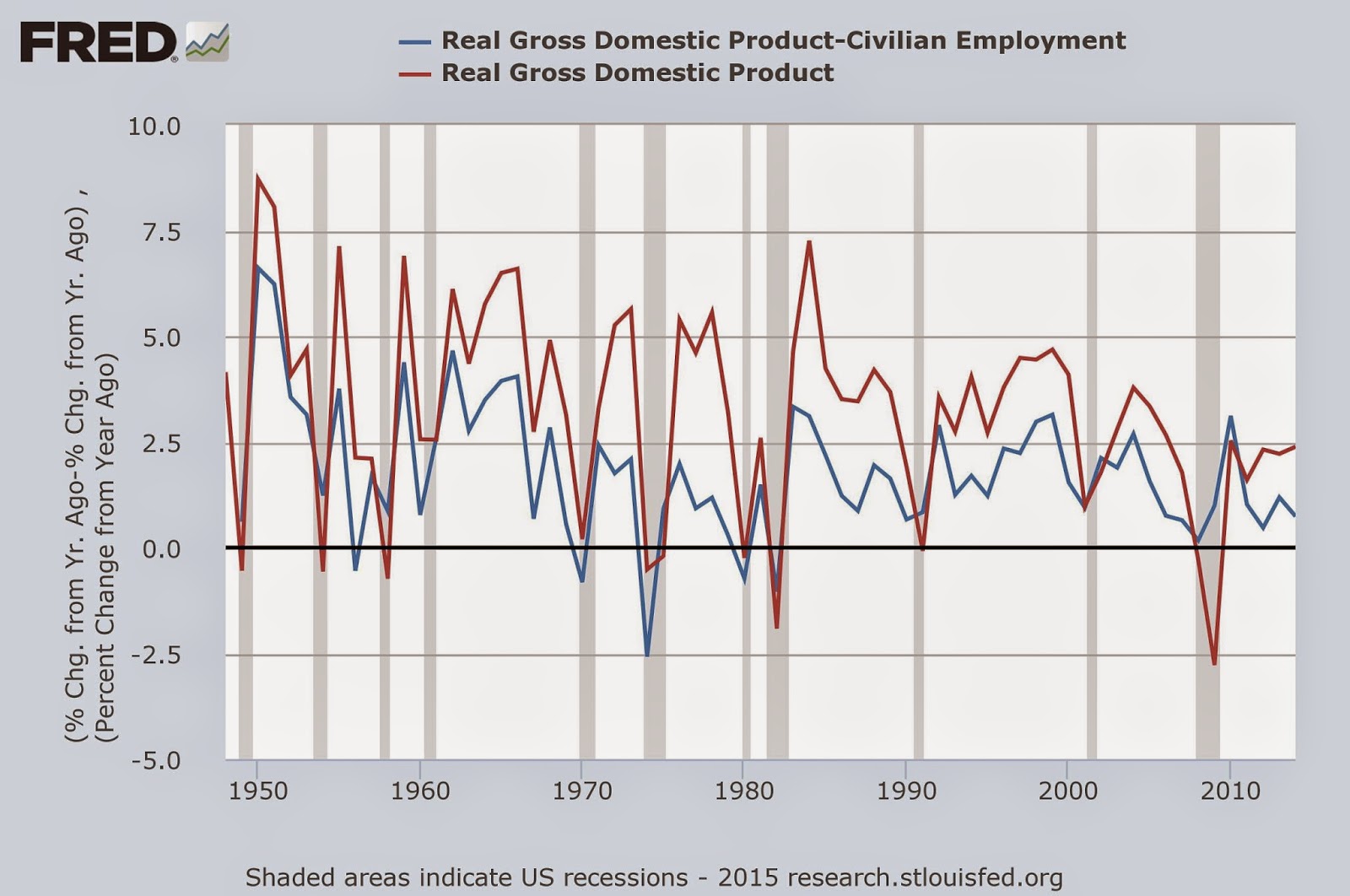So there has been some talk about productivity not being pro-cyclical anymore. This is based on the notion that labor productivity increased during the last few recessions. Robert Gordon is the main source of this view. That is, it would seem that labor productivity is now anti-cyclical. Note that pro-cyclical productivity is what is behind Okun's Law. So below the data, from Fred. Labor productivity, the difference between real GDP growth and civilian employment growth and real GDP growth itself.
It is hard to look at the graph and suggest that the two variables are not positively correlated, even for the post-1980s period. But it is true that if you look at the shaded areas, which represent recessions, it seems that productivity fell before, and was already recovering in that period, at least since the Bush senior recession. This is more about the timing of the recessions, and how these are measured by the NBER, than about the strength of the pro-cyclical relation between productivity and output.
There are a few additional problems with Gordon's views. Note that Gordon does not explicitly deal with the structural relation between labor productivity and growth, the so-called Kaldor-Verdoorn effect, and that's why he finds that the Okun effect is weaker overtime. I had written before on this here (or here), and noted that the Okun coefficient has always been around 2 (by the way, with updated data still is; more on that on a latter post).
The inability to separate the cyclical and structural components of the relation is what causes the change in the short run coefficient (the Okun one). It is still true that as economies grow, productivity picks up, since producers try to adapt to increasing demand by utilizing more effective methods of production.
It is hard to look at the graph and suggest that the two variables are not positively correlated, even for the post-1980s period. But it is true that if you look at the shaded areas, which represent recessions, it seems that productivity fell before, and was already recovering in that period, at least since the Bush senior recession. This is more about the timing of the recessions, and how these are measured by the NBER, than about the strength of the pro-cyclical relation between productivity and output.
There are a few additional problems with Gordon's views. Note that Gordon does not explicitly deal with the structural relation between labor productivity and growth, the so-called Kaldor-Verdoorn effect, and that's why he finds that the Okun effect is weaker overtime. I had written before on this here (or here), and noted that the Okun coefficient has always been around 2 (by the way, with updated data still is; more on that on a latter post).
The inability to separate the cyclical and structural components of the relation is what causes the change in the short run coefficient (the Okun one). It is still true that as economies grow, productivity picks up, since producers try to adapt to increasing demand by utilizing more effective methods of production.


This point is completely lost in the current debate. See also this chart relating unemployment to productivity: https://static1.squarespace.com/static/52c4c212e4b019e1bba20f52/t/54f81a5ce4b0fd351b5978b6/1425545820950/prod+1.JPG
ReplyDeleteMatias,
ReplyDeleteThank you for looking into this. I think it`s important to do so since any argument or evidence denying the procyclicality of productivity makes it harder to advocate measure to boost demand during downturns, as these will be regarded as inflationary...
However, I`m afraid I find Gordon's analysis more persuasive than you do. I mean, isn't it unlikely that the major structural shifts since the 80s (decline in labor power, rise in managerial control, etc) that Gordon describes have had no impact on the pro-cyclicality of labor productivity?
Actually it's not a matter of opinion. It's the facts. Once you account for the structural elements, Okun's Law remains the same. It was weaker in the past, and has always been (still is) around 2. There is no structural break. And the relation is positive, as it visible with the naked eye. So what's going on is simply that growth has been lower on average, and so has been job creation, when compared to the pre-1980s world. It's not the strength of the relations that is weaker, is the actual working of the economy that is worse, and that results from neoliberalism.
Delete